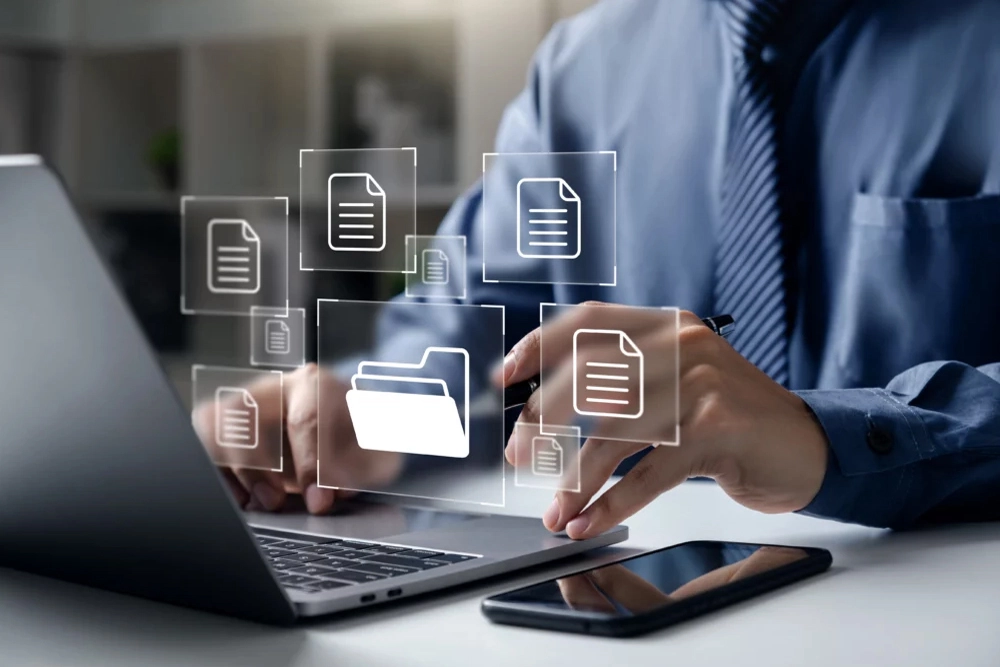In our digital age, the concept of complete digital transformation across all sectors, including businesses and government institutions, remains a work in progress. However, there’s exciting news on the horizon: the Internal Revenue Service (IRS), often a less-than-favorite topic for many, has set its sights on achieving a fully paperless operation by the year 2025.
This transition toward a more digital and paperless system promises substantial advantages for both the IRS and taxpayers alike. In this blog, we will explore the key highlights of the latest IRS update and why it brings such good news.



Let’s Delve into the Noteworthy Changes that will Accompany the IRS’s Decision to Digitalize its Procedures:
1. Positive News for the Environment: We often hear the saying that every significant journey begins with small steps. When organizations like the IRS and others worldwide make decisions or take steps like the one the IRS is about to implement, we can anticipate a positive impact on the environment. The move towards digitization or going paperless will significantly reduce fuel consumption for the transportation of forms. Zero dependence on paper forms means fewer trees will be cut down for paper production, leading to less deforestation. This, in turn, results in fewer companies engaging in paper manufacturing. These efforts align with global initiatives to reduce carbon footprints and combat climate change.
2. Enhanced Taxpayer Experience: As mentioned earlier, filing taxes and dealing with numerous forms can be exhausting and time-consuming, especially when using paper-based tax forms. However, with the digitalization of IRS procedures, taxpayers can expect a more streamlined tax filing process. Paying taxes and associated fees will become easier, and all essential documents can be accessed online from one location. If taxpayers need to make changes, they can do so online, eliminating the need for cumbersome paper forms that complicate the tax process, making it time-consuming and inconvenient.
3. Cost Savings: Some of you may wonder whether the IRS needs to cut its expenses. The answer is yes, as they collect money from taxpayers and do not create it magically. Managing and processing paper-based forms is a time-consuming and costly affair for the IRS. In addition to transportation and processing costs, expenses are incurred for storing physical copies of these forms, and this is not an inexpensive endeavor. By utilizing digital platforms and tools to perform the same operations without paper forms, the IRS can save millions of dollars annually. These savings can then be reinvested to enhance the taxpayer experience by adopting more advanced and efficient technology, making the process more cost-effective and convenient for taxpayers.
4. Data Accuracy, Error Reduction, and Improved Error Correction: It’s a well-known fact that manual and paper-based processes are less efficient, prone to errors, and challenging to correct when mistakes occur. However, with digital tax forms and tools, errors and inconsistencies can be significantly reduced. Digital data collection systems incorporate validation checks and mandatory fields in the digital forms, ensuring that the form cannot be submitted until the correct information is provided, thus guaranteeing data accuracy. Moreover, if someone needs to make changes to the information they’ve previously provided, it can be easily done. This not only minimizes the likelihood of errors but also enhances data accuracy. It’s likely that the platforms and tools they will use during their transition will incorporate AI, further enhancing the precision and efficiency of their work, much like how artificial intelligence and digital tools such as payroll software are revolutionizing payroll processing for companies.
5. Convenience and Accessibility: While we’ve touched on this earlier, it’s essential to delve a bit deeper. The digitalization of IRS processes means that their digital systems, tools, and forms are available online 24/7. Taxpayers can access them from anywhere and at any time. This accessibility allows them to file returns, check their tax status, and receive refunds conveniently. It empowers taxpayers to fulfill their obligations promptly and meet deadlines without incurring any penalties.
6. Secure Taxpayer Information: Paper-based forms and manual processes do not provide adequate data security for taxpayers’ information. However, with digitalization, the IRS will enhance the security and protection of client data, which is not possible with manual and paper-based methods. To ensure taxpayer data security, robust data protection protocols, encryption, and other cybersecurity measures can be implemented to safeguard data from potential threats. Taxpayers can rest assured that their financial and personal information is well-protected.
Conclusion
The IRS‘s ambitious goal of achieving a fully paperless operation by 2025 heralds a significant leap forward in efficiency and environmental responsibility. This transition promises benefits on multiple fronts, starting with a positive impact on our environment by reducing fuel consumption and deforestation. Taxpayers can look forward to a more streamlined and convenient experience, with cost savings that can be reinvested into improving services. Moreover, the shift to digital processes enhances data accuracy, error reduction, and security, providing taxpayers with greater peace of mind. As the IRS embraces the digital era, we can anticipate a future of smoother, more accessible, and secure tax-related interactions. If you want to learn from the experts in the industry with the free webinar training, then register for our free webinars available on our website.



